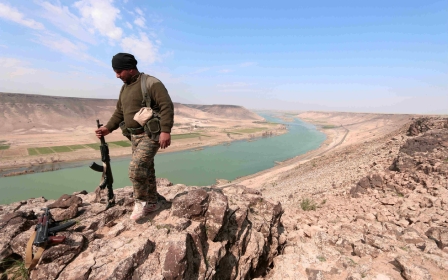Battle for Raqqa: Dam out of action as alliance readies attack on IS city

A Syrian dam under control of the Islamic State has been put out of action due to fighting near Raqqa with the militant group claiming that it could collapse and telling civilians to flee.
However a technical source at the Tabqa dam told AFP that there was no immediate threat but that water levels would continue to rise if repairs were not made.
The Syrian Democratic Forces (SDF), a US-backed Kurdish-Arab alliance, are battling IS for control of the dam near the IS de facto Syrian capital, which was forced out of service on Sunday after its power station was damaged, a technical source there told AFP.
SDF fighters on Sunday seized Tabqa's military airport from IS in northern Syria, a spokesman said.
The capture of Tabqa airbase comes as the alliance prepares an attack on IS's de facto Syrian capital Raqqa, seeking to effectively surround the city before launching its assault.
"The Syrian Democratic Forces have full control of Tabqa military airport and operations to clear and demine are underway in order to secure the airport fully," spokesman Talal Sello told AFP.
SDF forces entered the airport earlier on Sunday, backed by heavy artillery fire and air strikes by the US-led coalition, the Syrian Observatory for Human Rights monitor said.
IS seized the base from government troops in August 2014 and carried out one of its worst massacres there, killing as many as 200 government soldiers.
With support from the US-led coalition fighting IS in Syria and Iraq, SDF fighters have inched closer to Raqqa, taking territory to the north and east.
At their closest point, they are just eight kilometres from the city, to the northeast.
But they are mostly further away, between 18km and 29km from Raqqa.
Earlier this week, US forces airlifted SDF fighters behind IS lines to allow them to launch the Tabqa assault, and on Friday the alliance reached one of the dam's entrances.
Tabqa dam faces danger
But the fight for the dam, the biggest in Syria, forced it out of service on Sunday, risking dangerous rising water levels.
"Shelling on the area... that supplies that dam with electricity has put it out of service," the technical source said.
"The work needed to fix the problem is not possible because there is not sufficient staff available as a result of the intensive shelling in the area of the dam," he added.
"If the problem is not fixed, it will begin to pose a danger to the dam."
The SDF's Sello told AFP there was no imminent danger to the dam, adding it had not been hit in air strikes.
The dam remains under IS control, with SDF progress being hampered by the exposed nature of the terrain, which is also heavily mined, the Observatory said.
IS issued warnings through its propaganda agency Amaq that the dam "is threatened with collapse at any moment because of American strikes and a large rise in water levels".
But the source at the dam told AFP there had not yet been significant water level increases, though he acknowledged levels would rise if the facility remained out of service.
Earlier this year, the UN's humanitarian coordination agency OCHA said water levels in the Euphrates had risen 10 metres since late January, in part from heavy rainfall and snow.
But it warned that damage to the dam "could lead to massive scale flooding across Raqqa and as far away as Deir Ezzor" province to the southeast.
Any further rises in the water level or damage to the Tabqa dam "would have catastrophic humanitarian implications in all areas downstream," the UN warned.
More than 320,000 people have been killed in Syria since its conflict began in March 2011 with anti-government protests.
Stay informed with MEE's newsletters
Sign up to get the latest alerts, insights and analysis, starting with Turkey Unpacked
Middle East Eye delivers independent and unrivalled coverage and analysis of the Middle East, North Africa and beyond. To learn more about republishing this content and the associated fees, please fill out this form. More about MEE can be found here.




